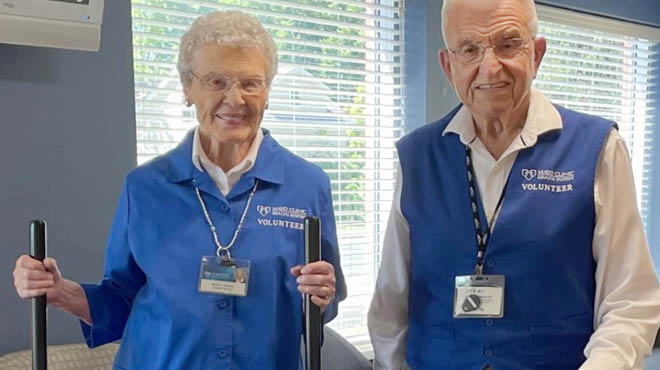Recent Posts
-

-
 Patient StoriesA lifesaver saved: An EMS veteran’s journey from rescue to recoveryNovember 14, 2025
Patient StoriesA lifesaver saved: An EMS veteran’s journey from rescue to recoveryNovember 14, 2025 -

Volunteers make connections, reap benefits

Every Wednesday, Mary and Ben Zweber arrive at the Mayo Clinic Health System hospital in New Prague, Minnesota, for their volunteer shift. Mary greets patients at the information desk, provides directions, cleans wheelchairs and keeps the lobby tidy and welcoming. Ben pushes the hospitality cart to approved patient rooms, offering them snacks, beverages and the opportunity for a friendly chat.
The Zwebers are old hands at volunteering. After being invited by a friend to join her as a volunteer, Mary, now 91, started at the hospital in 1990; Ben, now 92, signed up in 2007. "Mary inspired me," he says.
The Zwebers underscore filling a need and having a purpose as their main reasons for volunteering year after year. But it's knowing that they're helping people and making connections that give them an extra boost.
"Recently, an older visitor was nervous about taking the elevator because she'd been stuck in one at another facility," Mary says. "So I rode with her, and she was so grateful and relieved. I ride the elevator every shift, but it made someone else's day this time."
Ben tells about taking his cart to a patient who had a knee replacement and was feeling discomfort. "I told him, 'I have two new ones, and it does get better with time and physical therapy. You'll get there, too,'" he says. "The patient's son was visiting and tracked me down to thank me. He said his dad needed to hear that, which lifted his spirits. I was glad I could offer encouragement."
When asked what they would say to others about volunteering at Mayo Clinic Health System, the Zwebers say, "Come join us. The environment is great, and the patients and staff are wonderful."
Helping others, benefiting you
Research has shown that volunteering offers significant health benefits, especially for older adults, including:
- Improves physical and mental health.
Volunteering reduces stress and increases positive, relaxed feelings by releasing dopamine. By spending time in service to others, volunteers report feeling a sense of meaning and appreciation, both given and received, which can have a stress-reducing effect. - Provides a sense of purpose and teaches valuable skills.
At Mayo Clinic Health System, volunteers serve as greeters and waiting room attendants, provide patient room information and directions, and help transport patients and patient items. Many volunteers use their craft skills to make prayer shawls, blankets, sweaters and hats for newborn babies and people with cancer. Other services that volunteers provide include working in the hospital gift shop, performing clerical duties for staff and offering pet therapy through the Paws Force team. - Nurtures new and existing relationships.
Volunteering increases social interaction and helps build a support system based on common interests. One of the best ways to make new friends and strengthen existing relationships is to participate in a shared activity. Volunteers often have diverse backgrounds, and participating in a volunteer activity helps them expand their social network and allows them to practice social skills with others.
People volunteer for different reasons, such as exploring careers, sharpening skills, staying active during retirement, meeting new people and serving their communities. Yet all volunteers share a common desire to improve the health and welfare of people in their communities.
How you can make a difference
If you'd like to make a difference for Mayo Clinic Health System patients and staff, you can find volunteering opportunities in various service areas with flexible schedules and commitments, along with engagement and enrichment options that fit you best. Check out the options at your preferred location.